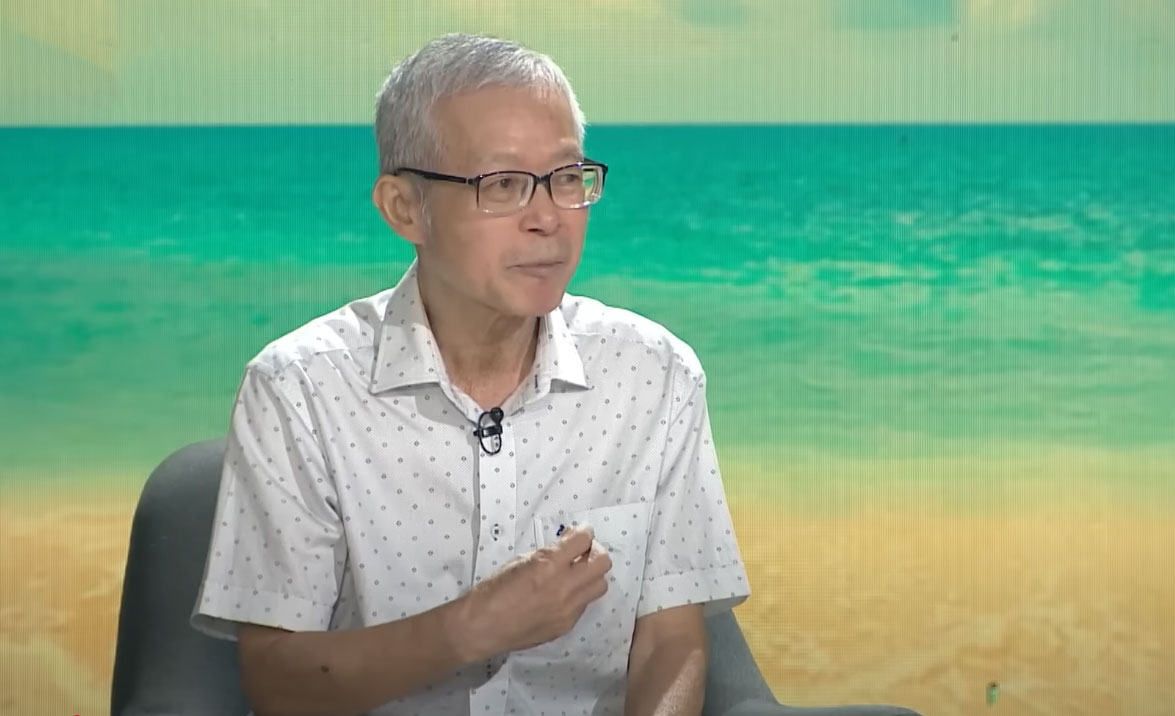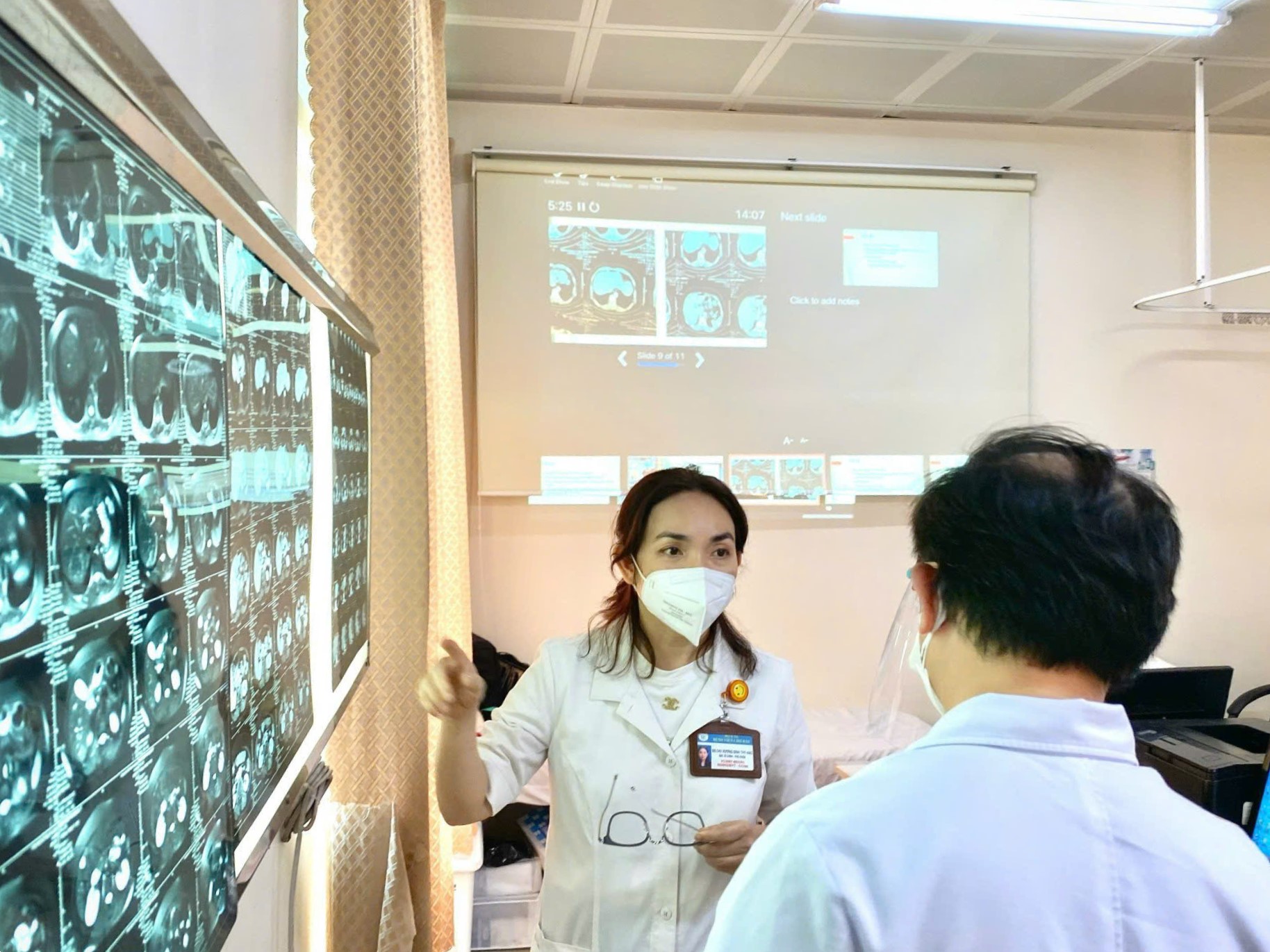Mr. Cuong shared his story with Associate Professor, Doctor Vuong Dinh Thy Hao, Deputy Head of the Department of Radiation Oncology at Cho Ray Hospital's Cancer Center in Ho Chi Minh City, on the Alo Doctor program, which aired on 29/6. Mr. Cuong first experienced difficulty swallowing in July 2024. After being diagnosed with esophageal cancer at a local hospital, he was referred to Cho Ray Hospital for treatment.
The disease drastically changed his family's life. His increasing difficulty swallowing prevented him from eating normally, leading to rapid weight loss. Fear of the disease caused him constant anxiety and distress.
"Our family used to be filled with laughter, especially during meals, but now it's silent. Everyone is afraid of cancer," Mr. Cuong said, adding that their once bright life had turned gray.
 |
Nguyen Dinh Cuong shares his experience with cancer on 29/6. Photo: NVCC |
Nguyen Dinh Cuong shares his experience with cancer on 29/6. Photo: NVCC
Without hesitation, he and his wife traveled 500 km for treatment. After a year, his condition has improved significantly. While he initially struggled to swallow even a sip of water, he can now eat bananas, thin porridge, and drink a full glass of orange juice.
According to Mr. Cuong, the frequent travel between Khanh Hoa and Ho Chi Minh City, combined with the worries and consequences of cancer, took a toll on his mental health. He ate less, lost weight, and experienced constant fatigue. However, he and his family remained determined to avoid unproven treatments.
"I believe staying positive, maintaining a healthy diet, exercising gently, trusting in medical science, and relying on family are key to overcoming illness," Mr. Cuong said.
Esophageal cancer is a difficult-to-treat cancer with a generally poor prognosis. Common symptoms include difficulty swallowing, painful swallowing, and reduced food intake. The tumor's obstruction causes the swallowing difficulties, progressing from an initial feeling of blockage to complete inability to eat or drink, often resulting in malnutrition.
Due to its rapid progression, the disease is often detected in late stages, when patients have already suffered from prolonged malnutrition, anemia, and fatigue, making treatment more challenging and expensive. The recurrence rate is also high without thorough initial treatment.
Globocan 2022 statistics show that esophageal cancer ranks 12th among common cancers in Vietnam. Vietnam, along with China and South Korea, is located in an esophageal cancer epidemic zone, accounting for over 50% of global cases. The incidence is higher in men than in women. Risk factors include heavy alcohol consumption and smoking.
 |
Doctor Vuong Dinh Thy Hao consults to determine a treatment plan for a patient. Photo: NVCC |
Doctor Vuong Dinh Thy Hao consults to determine a treatment plan for a patient. Photo: NVCC
Associate Professor, Doctor Vuong Dinh Thy Hao, Deputy Head of the Department of Radiation Oncology at Cho Ray Hospital's Cancer Center, said the center receives around 500 new esophageal cancer cases each year, many of which are severe and diagnosed in late stages. Before advanced treatment methods were available, esophageal cancer had the 7th highest mortality rate among common cancers.
In response to the burden of this disease, medicine has developed various treatment methods, including chemotherapy, radiation therapy, immunotherapy (also known as immune checkpoint inhibitor therapy), and surgery. Minimally invasive surgery in early stages and robot-assisted surgery are among the newer methods being applied. Early detection combined with surgery and adjuvant therapy can lead to remission and prolonged survival. For late-stage or post-surgical recurrence, systemic drug therapy is necessary.
Mr. Cuong's tumor location in the esophagus prevented surgery. He was initially treated with radiation therapy, which proved ineffective. He was then prescribed systemic treatment with immunotherapy combined with chemotherapy. After a few cycles, his symptoms improved significantly, showing a good response to the treatment.
According to Dr. Hao, immunotherapy offers hope for cancer patients, including those with esophageal cancer. This therapy enables white blood cells to identify and destroy cancer cells without harming healthy cells. Combining it with chemotherapy creates a synergistic effect, enhancing treatment efficacy.
"Patients need to understand cancer and trust in modern medicine. This leads to higher treatment success rates, allowing patients to make the most of crucial time and improve their quality of life," Dr. Hao added.
Sharing the same view, Mr. Cuong acknowledged that no method guarantees a 100% cure, but it's essential to trust in science.
"My family and I have followed the doctor's instructions, adhering to the appointment schedule without missing any. The doctor is treating me, so I must do my part," he said.
Van Ha
The Alo Doctor program aired on 29/6 on VTV9. The program is medically coordinated by the Vietnam Private Hospital Association and sponsored by MSD for educational purposes.












